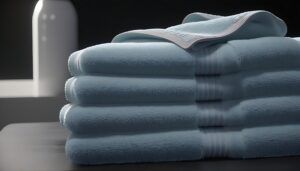Introduction:
Keeping our daily life clean has a direct impact on our general health and well-being. Towels are one of the things we use on a daily basis and are quite important for personal hygiene. Nevertheless, their importance is sometimes overlooked unless we take the possibility of bacteria into account. Knowing how much bacteria is present in towels is important in this day and age, when people are becoming more conscious of the health dangers. Towels come into direct contact with our skin when we use them for anything from drying off after a revitalizing shower to wiping hands in the kitchen. For this reason, their cleanliness is quite important. The purpose of this article is to explore the topic of bacterial presence in towels and provide insight into the level of contamination and its potential health risks.
Understanding Bacterial Colonization:
To fully appreciate the possible risks connected to commonplace products like towels, one must have a basic understanding of bacterial colonization. The process that bacteria go through to establish themselves and multiply in a certain environment is called bacterial colonization. Towels provide the perfect environment for germs to grow because of their organic content, moisture content, and warmth. Bacteria can grow quickly once they have taken hold of a towel, raising the possibility of contamination. Towels can harbor a variety of germs, including dangerous and benign varieties. Towels can retain a wide variety of bacteria, even in spite of efforts to keep them clean, which could be harmful to your health. We may put into practice practical methods to reduce dangers and uphold hygienic standards by comprehending the process of bacterial colonization.
Factors Influencing Bacterial Load:
The amount of germs in towels varies depending on a number of circumstances, which impacts both the cleanliness and health hazards associated with them. The amount of moisture matters because wet towels create the perfect atmosphere for the growth and spread of bacteria. Bacteria also accumulates as a result of frequent towel use, particularly if the towels are not frequently laundered. The towel’s composition is also important because different types of fabric might contain different amounts of bacteria. The amount of bacteria in an environment is also influenced by temperature and humidity, with warmer and more humid environments encouraging the growth of bacteria. In order to minimize bacterial contamination in towels and adopt appropriate hygiene measures, it is imperative to have a thorough understanding of these aspects. We can keep our towels cleaner and lower the danger of bacterial infections by taking care of these factors.
Impact on Health:
The significance of bacterial contamination in towels for health cannot be overstated, since it presents a number of hazards to people’s health. Towel-borne bacteria can cause a variety of skin illnesses, ranging from folliculitis and acne to more serious ailments like cellulitis. Inhaling bacteria in the air or bacterium that is transmitted from cloths to the face can potentially cause respiratory problems. Additionally, certain bacterial strains that are frequently found in towels might cause allergic reactions in sensitive people. Bad towel hygiene might weaken the immune system and make pre-existing diseases worse. People can take preventative action to safeguard themselves and their loved ones by being aware of the health risks associated with bacterial contamination in towels. Come explore the complex connection between general health and towel hygiene with us.

Hygiene Practices for Towel Usage:
To reduce bacterial contamination and preserve cleanliness, using towels in accordance with good hygiene practices is crucial. To properly eliminate germs and other impurities, it is important to routinely wash towels in hot water with detergent. It is possible to stop the growth of bacteria in moist surroundings by making sure towels are properly dried after each usage. Cross-contamination is lessened when towels are used for distinct functions, such as hand and body towels. By reducing exposure to potentially contaminated surfaces, choosing air drying over dryer use can also assist maintain towel hygiene. Further inhibiting bacterial development can be achieved by selecting antimicrobial towels or adding antimicrobial compounds to laundry detergents. Individuals can reduce the incidence of bacterial-related illnesses and encourage safer towel usage by implementing these hygiene habits.
Microfiber Towels vs. Traditional Cotton Towels:
Traditional cotton towels and microfiber towels differ significantly in a few key ways that could affect which is better suited for a given use. Microfiber towels, made of synthetic materials like polyester and polyamide, are made from the same cotton fibers as genuine cotton towels. Because of their great absorbency and quick drying time, microfiber towels are a great choice for outdoor activities, travel, and athletic events. Nevertheless, normal cotton towels are typically found in spas and bathrooms since they appear softer and more opulent. Since they are small and light, microfiber towels are the ideal choice for on-the-go use. Conversely, cotton towels are typically heavier and thicker.
Innovations in Antimicrobial Towels:
Antimicrobial towel technology has seen significant advancements in recent years with the goal of improving hygiene and lowering bacterial contamination. The incorporation of silver nanoparticles, which confer antimicrobial characteristics that prevent bacterial growth, into towel fibers is one notable advancement. These towels provide long-lasting defense against germs, fungi, and other dangerous pathogens, which makes them perfect for anyone with immune system disorders or sensitive skin. Another innovation is the infusion of natural antimicrobial compounds into towel materials to fight bacteria. Examples of these agents include tea tree oil and bamboo charcoal. Furthermore, developments in textile technology have produced self-cleaning towels with unique coatings that ward off bacteria and dirt for prolonged freshness.
Conclusion:
To sum up, keeping your towels clean is essential for maintaining personal hygiene and lowering your chance of contracting illnesses linked to microorganisms. Bacteria in towels can cause serious health problems, such as respiratory disorders and skin infections. People can prevent infections by being aware of the elements that lead to bacterial colonization, practicing good hygiene, and looking into cutting-edge remedies like antimicrobial towels. It’s important to develop the habits of routine washing, thorough drying, and utilizing different towels for varied uses. Furthermore, utilizing antimicrobial agents and selecting the appropriate towel material will improve overall wellbeing and cleanliness even more. Let’s put the cleanliness of our towels first as we traverse the complexity of daily hygiene because it’s an essential part of living a healthy lifestyle.


Amazing
Nice
Great
good